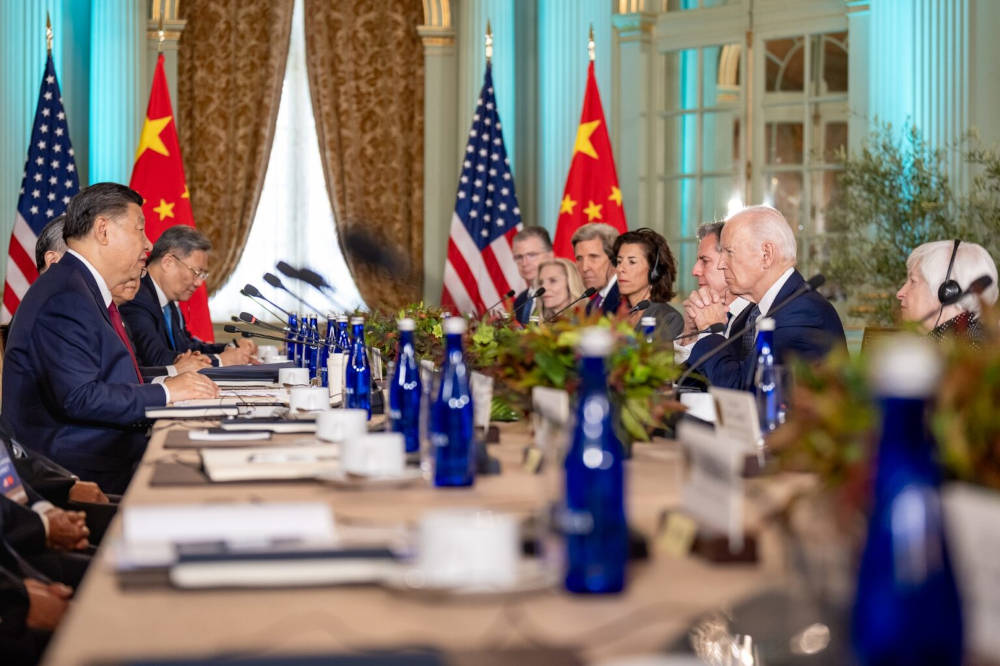[Source: US Embassy and Consulates in China]
Through December, we will publish a series of essays that offer fresh insight into the Events That Shaped Our World in 2023. You can follow the series here.
The recent meeting between US President Joe Biden and Chinese President Xi Jinping in San Francisco raised hopes about the relationship between the two superpowers. The two countries agreed to cooperate on counternarcotics, AI governance and climate change, to reestablish military contacts and increase passenger flights. Chinese premier Li Qiang described the upswing as a ‘rainbow after a round of wind and rain’.
Even a year ago, the climate was marked by heavy winds and rains. Top-level US policy advisers referred to China as the ‘only country intending to reshape the international order and increasingly, the economic, diplomatic, military and technological power to do it’. A diplomatic confrontation escalated over spy balloons flying over the US, which the Americans insisted were Chinese against strong denials by China.
These were tempered by a few factors. Their economies are interdependent, trading $700 billion worth of goods and services every year. Isolating China would cut global GDP by 7%, according to the IMF. The cheap Chinese goods keep US inflation at bay, a key consideration ahead of presidential elections. Engaging American companies in geopolitical battles would erode their profits. Meanwhile, Xi is worried about the alarming decrease in FDI in China, even as its economy struggles to recover. Neither of them wants an economic MAD (mutually assured destruction).
Even in the spy balloon incident, the initial tensions toned down after back-to-back visits of senior Biden administration officials, including Secretary of State Anthony Blinken, US Treasury Secretary Janet Yellen, Climate Envoy John Kerry and US Commerce Secretary Gina Raimondo.
Raimondo’s visit was particularly reassuring. She said that a strong Chinese economy was a good thing. She assured that the trade and investment relationship does not involve national security concerns. The two countries agreed to form a commercial issues working group, composed of government and private sector representatives to avoid misunderstandings of US national security policies and export controls.
Does this represent a significant breakthrough, or merely a ‘cyclical warming-up amid a structural deterioration in the relationship?’
I would argue it is a tactical pause, forced by immediate geopolitical compulsions. Biden wants to engage with China because it can influence outcomes in the Ukraine war and the Israel-Hamas conflict in Gaza. Besides, he needs Chinese collaboration in the climate change negotiations.
However, the deeper structural problems will overshadow these immediate compulsions.
Since China started making significant changes in its foreign policy post-2008 US financial crisis, Sino-US ties hit a rough patch. China began to flex its diplomatic muscle and described its relations with the US as a ‘new type of great power relations’. The Obama administration quickly countered China’s ambitions by initiating the Trans-Pacific Partnership (TPP), which irked China. Xi switched to the ‘striving for achievement’ (SFA) policy from the earlier ‘lying low’ policy. Although the Trump administration scrapped the TPP, the trade war initiated by Trump led to a new low in bilateral ties. Thereafter, the wolf-warrior diplomacy from the Chinese, followed by the tech supply chain disruption started by Trump and later followed by far more stringent measures by Biden, caused bilateral ties to sink to a new low. In other words, the tensions between both sides are more fundamental, and only the economic interdependencies partially hid the animosities. This whole rivalry manifested in tech control regimes and growing military competitiveness.
Further, despite the revival of trade and commercial ties, the tech supply chain disruption is the biggest obstacle in bilateral relationships. Measures like the Creatting Helpful Incentives to Produce Semiconductors Act (CHIPS Act) and the August 2023 Executive Order targeting China have been perceived as US attempts to bully China. Xi, at a high-level meeting, termed US tech sanctions as ‘an all-round containment, encirclement, and suppression’. In other words, China interpreted US sanctions as a systematic and intentional move to contain its tech march. At the same time, the US tried to justify its highly stringent export control regime aimed at China as a ‘small yard, high fence’ (xiao yuan, gao qiang).
While the Americans are terming the current engagement as an evolution from ‘decoupling’ to ‘de-risking’, China interprets ‘de-risking’ as a pretext for containing China. The recent American initiatives to get bilateral ties back on track to set the ‘floor’ to arrest the deterioration of bilateral relations have caused deep distrust among Chinese leadership.
China under Xi is dismissive of US attempts to establish floor/guardrails and believes that competing with the US is a ‘protracted struggle’ (a word used frequently in the Communist Party documents). This period of chaos will finally lead to victory for the Chinese. The US perceives these pronouncements as manifestations of China’s ‘striving for achievement’ policy under Xi. The latest China Military Power Report 2023 explicitly states that China is the topmost challenger to the US. The report clearly expressed concerns about the People's Liberation Army’s (PLA’s) growing abilities to arm-twisting tactics. The growing wariness has led to increasing investments in military capabilities. The US has allocated unprecedented levels of budget for military R&D. The US has deepened alliances with other Asian countries like Japan and India (major tech and defense agreements rarely extended to non-NATO countries) and the Philippines and Taiwan (addressing asymmetric capabilities).
Despite optimistic overtones, both sides are deeply aware of the nature of ‘strategic competition’ between them and perceive each other as ‘systemic rivals’. Thus, the latest Xi-Biden San Francisco meeting is merely an exercise in setting realistic expectations for bilateral ties and setting up the process to set the relations on a steady course. At best, it is merely a sign of a growing level of political engagement.
The apparent ‘detente’ is a brief pause to regroup; eventually, we will continue to see the unraveling of thunderstorms and lightning in Sino-US ties.
Dig Deeper
1. How Biden could “thaw” US relations with China | Brookings
2. U.S.-China relations are now more about crisis prevention | CNBC
3. China’s State Press Calls U.S. Exceptionalism a Museum Relic | Foreign Policy
4. State Vs Big Tech: Splinternet and the geopolitics of tech regulation | Founding Fuel
5. The US-China war for tech supremacy is splitting the world in two | Founding Fuel
The next question in this series:
Is the US in strategic retreat across the region from Djibouti to the Solomon Islands? And does China have the capability to increasingly dominate this space?
On Monday, December 18, we will publish Kanti Prasad Bajpai’s take. He is Vice Dean (Research and Development) and Wilmar Professor of Asian Studies, Lee Kuan Yew School of Public Policy, the National University of Singapore.

